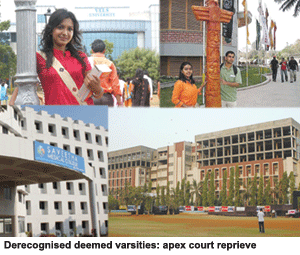 Year 2010 promised much for indian education but delivered little. Most of the widely welcomed reforms initiated for revitalising Indian K-12 and higher education announced by Union human resource development (HRD) minister Kapil Sibal soon after he was allotted the vital HRD portfolio in the Congress-led UPA-2 government which was returned to power in New Delhi in the general election of May 2009, remained to be translated into reality in 2010. But with the Commonwealth Games and 2-G spectrum allocation scams — the two largest heists of the public exchequer in the history of post-independence India — dominating political and national discourse, and the UPA-2 government (and Sibal who has been given additional charge of the telecom ministry) forced to concentrate their energies on firefighting these mind-boggling corruption scandals, the long overdue reform of Indian education across the spectrum received scant attention.
Year 2010 promised much for indian education but delivered little. Most of the widely welcomed reforms initiated for revitalising Indian K-12 and higher education announced by Union human resource development (HRD) minister Kapil Sibal soon after he was allotted the vital HRD portfolio in the Congress-led UPA-2 government which was returned to power in New Delhi in the general election of May 2009, remained to be translated into reality in 2010. But with the Commonwealth Games and 2-G spectrum allocation scams — the two largest heists of the public exchequer in the history of post-independence India — dominating political and national discourse, and the UPA-2 government (and Sibal who has been given additional charge of the telecom ministry) forced to concentrate their energies on firefighting these mind-boggling corruption scandals, the long overdue reform of Indian education across the spectrum received scant attention.
Thus while the Union cabinet cleared the Foreign Educational Institutions (Regulation of Entry and Operations) Bill, 2010, it couldn’t be tabled in the winter session of Parliament which was disrupted for 22 of its 30 days span by opposition parties demanding a joint parliamentary probe in the 2-G spectrum allocation scandal. Ditto the National Commission for Higher Education and Research (NCHER) Bill, 2009 which proposes replacement of the University Grants Commission, All India Council for Technical Education and National Council for Teacher Education by a powerful NCHER.
Moreover the slapdash speed with which Sibal and his ministry are drafting and tabling education legislation before the standing committees of Parliament hasn’t gone down well with some members of Parliament either. The parliamentary standing committee on HRD has returned the ministry’s Prohibition of Unfair Trade Practices Bill 2010, the Medical Council of India Amendment Bill, 2010 and the Education Tribunals Bill, 2010 for tighter drafting. In a report submitted to Parliament on September 24, the standing committee (every ministry is ‘attached’ to an all-party standing committee which scrutinises and tightens Bills drafted by the ministry for presentation and passage through both houses of Parliament) recommended “a wider consultation process involving all the state and Union territory governments”.
Sibal’s singular triumph of 2010 is the Right to Free and Compulsory Education Act, 2009 (aka RTE Act) — seven years in the works which became law on April 1. But even this historic legislation, which makes it mandatory for the State, i.e. Central, state and/or local governments, to ensure provision of free-of-charge elementary education to every child between the ages of six and 14, has provoked a spate of writ petitions in the Supreme Court. The country’s 175,885 private unaided or independent schools are up in arms protesting infringement of their fundamental right to establish and administer education institutions without government interference, and of their promoters to engage in a legitimate ‘occupation’ as guaranteed by Article 19 (i)(g) of the Constitution. Constitutional issues apart, several other provisions of the well-intentioned RTE Act have cheesed off educators and education-ists countrywide. For instance the Delhi Commission for Protection of Child Rights has received over 10,000 complaints of violations of the RTE Act in the national capital region until December 21. And most of the country’s 29 state governments are yet to finalise Rules for implementation of the RTE Act within their jurisdiction.
Nevertheless, although the year that was belied the promise of a leap forward for Indian education, it wasn’t entirely fruitless. A common core curriculum for science and mathematics was agreed upon by all higher secon-dary examination boards countrywide effective from the next academic year (2011-12); a unified admissions process for entry into the undergrad and postgrad programmes of 39 Central government universities nationwide will become operational in July; the Bombay and Madras high courts struck down government appointed fees regulation committees to determine the tuition fees of private unaided schools in Maha-rashtra and Tamil Nadu, signaling growing judicial impatience with government micro-management of private education.
Even though the year 2010 was a year of business as usual for Indian education, as testified by a flurry of activity in private education and the voluntary (NGO) sectors, there’s grow-ing nationwide awareness that the quality of education dispensed in India’s 1.3 million schools, 31,000 colleges, 509 universities, and much-too-few professi-onal and vocational education colleges/institutes, needs urgent upgradation.
In the following pages, Summiya Yasmeen summarises major initiatives and achievements in Indian education in the recently concluded year.
TN Uniform School Education Act passed
January 9. The Tamil Nadu state legislative assembly passed the Uniform System of School Education Act, 2010 decreeing a common curriculum for all schools affiliated with the Tamil Nadu State Examinations Board (TNSEB). Earlier the state government had formally abolished the state’s four separate school exam boards, i.e. the Tamil Nadu Secondary School Leaving Certificate Examination; Anglo Indian School Certificate Examination; Matriculation; and Oriental School Leaving Certificate Examination boards, and replaced them with a common TNSEB. With the enactment of this legislation all TNSEB affiliated schools are directed to closely follow the board’s prescribed curriculum and textbooks. The Uniform System of School Education Act became effective for children in classes I-VI from the academic year 2010-11, and for students in classes VII- X will become operational in 2011. (see Education News, EW February 2010)
ASER Report dampener
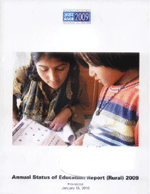 January 15. The Mumbai-based education NGO Pratham released its Annual Status of Education Report (ASER) 2009. This annual report measures the learning outcomes of children enroled in primary schools in 575 rural districts, across India. As in the five years past since Pratham commenced this valuable annual survey of learning outcomes in 2005, ASER 2009 does-n’t offer good news. The percentage of class V children in government schools who can read and comprehend class II texts has been static at 50 percent for the past four years. The maths learning outcomes of children in government schools is even worse, with the percentage of children in class V able to do simple division sums declining from 41 percent in 2007 to 36 percent in 2009.
January 15. The Mumbai-based education NGO Pratham released its Annual Status of Education Report (ASER) 2009. This annual report measures the learning outcomes of children enroled in primary schools in 575 rural districts, across India. As in the five years past since Pratham commenced this valuable annual survey of learning outcomes in 2005, ASER 2009 does-n’t offer good news. The percentage of class V children in government schools who can read and comprehend class II texts has been static at 50 percent for the past four years. The maths learning outcomes of children in government schools is even worse, with the percentage of children in class V able to do simple division sums declining from 41 percent in 2007 to 36 percent in 2009.
The report, compiled by 30,000 volunteers who fan out across rural India every October onwards, found that as a consequence of poor learning outcomes in government primaries, the percentage of rural households paying for private tuition is steadily increasing. The percentage of government school children availing private tuition increases as children move into higher classes: from 17.1 percent in class I to 30.8 percent in class VIII. (Education News, EW February 2010)
Deemed universities derecognition recommendation
.gif) January 18. The Union HRD ministry submitted an affidavit in the Supreme Court recommending derecognition of 44 of the country’s 127 private deemed universities. The affidavit was based on a report of the P.N. Tandon Comm-ittee which recommended derecognition of the 44 deemed universities (spread across 13 states) on grounds of severe infrastructure and management deficiencies.
January 18. The Union HRD ministry submitted an affidavit in the Supreme Court recommending derecognition of 44 of the country’s 127 private deemed universities. The affidavit was based on a report of the P.N. Tandon Comm-ittee which recommended derecognition of the 44 deemed universities (spread across 13 states) on grounds of severe infrastructure and management deficiencies.
Expectedly, managements of the blacklisted deemed universities challenged the affidavit in the apex court. On January 25 the court issued a cease and desist order to the Union government staying all action against the 44 impugned deemed universities. In their defence the blacklisted varsities claimed that they had been thoroughly inspected by the Delhi-based University Grants Commission prior to being conferred deemed university status. They claimed the Tandon Committee had made the derecog-nition recommendation based on a mere 10 minute presentation extracted from them. (Education News, EW February 2010)
NCHER Bill presented for public debate
February 1. The draft National Commission for Higher Education and Research (NCHER) Bill was presented for public debate. The NCHER Bill proposes replacement of the University Grants Commission, All India Council for Technical Education and National Council for Teacher Education by a powerful NCHER which will take over all the responsibilities of these higher education supervisory organisations including licensing, monitoring academic and governance standards, disbursing grants and appointing vice chanc-ellors. The draft Bill envisages a powerful regulatory and supervisory NCHER comprising seven members headed by a chairman appointed by the President of India on the recommen-dation of a selection committee including the prime minister, speaker of the Lok Sabha, the leader of the opposition, among others.
Common curriculum proposal approved
.gif) February 16. The Council of Boards of School Education (COBSE), comprising 42 Central and state school-leaving examination boards country-wide, approved a proposal to adopt a core curriculum for physics, chemistry, biology and mathematics at the senior secondary level (classes XI-XII). The new curriculum will come into effect from the academic year 2011-12, HRD minister Kapil Sibal announced after a meeting with member-boards of COBSE.
February 16. The Council of Boards of School Education (COBSE), comprising 42 Central and state school-leaving examination boards country-wide, approved a proposal to adopt a core curriculum for physics, chemistry, biology and mathematics at the senior secondary level (classes XI-XII). The new curriculum will come into effect from the academic year 2011-12, HRD minister Kapil Sibal announced after a meeting with member-boards of COBSE.
Though only 20 exam boards have thus far signed the core curriculum agreement, the proposal was widely welcomed by educationists on the ground that it will result in standard-isation of teaching-learning in these core subjects countrywide, and smooth the way for a common national entrance examination for professional higher study programmes by 2013. With the core curriculum agenda for maths and science clinched, COBSE is now working on a common higher secondary curriculum for commerce. (Education News, EW March 2010)
Union Budget neglects education
.gif) February 26. Union finance minister Pranab Mukherjee presented the Union Budget 2010-11 to Parliament. In his 107-minute budget speech, Mukherjee increased the plan outlay for (school) education from Rs.26,800 crore in fiscal 2009-10 to Rs.31,036 crore this year — a 15 percent increase. Of this amount Rs.25,000 crore is for elementary education (including Rs.9,300 crore for the national mid-day meal scheme) and Rs.4,700 crore for secondary education. The outlay made for higher education remained static at Rs.10,992 crore. But even with this 15 percent higher outlay for education, the Central government’s total expenditure for education aggregates a mere Rs.42,036 crore, equivalent to 0.68 percent of GDP. (Special Report, EW April 2010)
February 26. Union finance minister Pranab Mukherjee presented the Union Budget 2010-11 to Parliament. In his 107-minute budget speech, Mukherjee increased the plan outlay for (school) education from Rs.26,800 crore in fiscal 2009-10 to Rs.31,036 crore this year — a 15 percent increase. Of this amount Rs.25,000 crore is for elementary education (including Rs.9,300 crore for the national mid-day meal scheme) and Rs.4,700 crore for secondary education. The outlay made for higher education remained static at Rs.10,992 crore. But even with this 15 percent higher outlay for education, the Central government’s total expenditure for education aggregates a mere Rs.42,036 crore, equivalent to 0.68 percent of GDP. (Special Report, EW April 2010)
RTE Act, 2009 challenged
March 9. The Jaipur-based Society for Unaided Private Schools of Rajasthan (SUPSR) filed an anticipatory writ petition in the Supreme Court challenging the constitutional validity of several provisions of the Right to Free and Compulsory Education Act, 2009 (aka RTE Act), including s.12(i) which makes it mandatory for private schools to reserve a 25 percent quota in pre-school or class I for poor children residing in their neighbourhoods. The society alleged infringement of the fundamental right of minority and private unaided schools to “establish and administer educational institutions of their choice”. “The Act is… violative of the fundamental right of private unaided schools enshrined under Article 19(1)(g) of the Constitution and minority schools enshrined under Articles 29 and 30 of the Constitution,” said the petition.
This writ petition was admitted on March 22 by a Supreme Court bench comprising Chief Justice K.G. Balakrishnan and Justice Deepak Verma who initially directed the petitioner to the Rajasthan high court, but later issued notices to the Union HRD and law ministries after SUPSR counsel submitted that the issues involved concerned the entire nation.
Following the SUPSR writ petition, three other petitions filed by associations of private unaided schools (Independent Schools’ Federation of India; Association of Schools of Indian School Certificate Examinations; and Action Committee of Unaided Private Recognised Schools) have been admitted by the apex court. (Special Report, EW June 2010)
Cabinet clears Foreign Education Institutions Bill
March 15. The Union cabinet cleared the Foreign Educational Institutions (Regulation of Entry and Operations) Bill, 2010. The Bill, first introduced in the Rajya Sabha in 1995, and later revived in 2007 but vetoed by the communist parties, got a fresh lease of life after HRD minister Kapil Sibal included it in his 100-day agenda last year (July 2009). The objectives of the Bill are augmentation of capacity in higher education, as also saving an outflow estimated at $7.5 billon (Rs.33,750 crore) per year of foreign exchange expended by over 100,000 students traveling abroad for higher education.
The provisions of the FEI Bill stipulate an eight-month time bound format for granting approval to foreign institutions to set up campuses on a stand-alone or collaboration basis subject to them levying “reasonable” tuition fees, and reinvesting surpluses in Indian operations. (Education News, EW April 2010)
Azim Premji University Bill passed
March 18. The Karnataka legislative council passed the Azim Premji University Bill, 2010. The Bill, which was passed amid a walkout by opposition party members, clears the decks for establishment of an Azim Premji University in Bangalore by the Azim Premji Foundation, a charitable trust registered in 2001 by Premji, the promoter-chairman of Wipro Corpor-ation (annual sales revenue: Rs.10,600 crore).
According to Aravind Limbavalli, the state’s higher education minister, APU will be the 43rd private university in the country and will focus on training teachers for primary and secondary schools, in addition to offering diploma and degree programmes in education management, education policy, elemen-tary education, teacher and technology education. The estimated investment in the varsity is expected to be Rs.200 crore, including an endowment fund of Rs.25 crore. (Education Notes, EW April 2010)
RTE Act becomes law
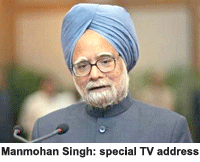 April 1. The Right to Free and Compulsory Education Act, 2009 (aka RTE Act), which makes elementary education a fundamental right of all children aged six-14 years, became law. The enactment of this long-debated legislation prompted a special televised address to the nation by prime minister Dr. Manmohan Singh, in which he proclaimed that approval of the Bill by Parliament was a personal dream come true. “Today what I am, I am because of education. So, I want the light of education should reach to all… The government is committed to ensuring that all children irrespective of gender and social category, have access to education and fund constraints would not be allowed to hamper the implemen-tation of the Right to Education Act,” he said on this historic occasion.
April 1. The Right to Free and Compulsory Education Act, 2009 (aka RTE Act), which makes elementary education a fundamental right of all children aged six-14 years, became law. The enactment of this long-debated legislation prompted a special televised address to the nation by prime minister Dr. Manmohan Singh, in which he proclaimed that approval of the Bill by Parliament was a personal dream come true. “Today what I am, I am because of education. So, I want the light of education should reach to all… The government is committed to ensuring that all children irrespective of gender and social category, have access to education and fund constraints would not be allowed to hamper the implemen-tation of the Right to Education Act,” he said on this historic occasion.
EW ranks India’s best pre-schools
.gif) May 7. Education-World published the first-ever league tables of India’s most preferred pre-schools 2010 based on a survey condu-cted by Delhi-based market research and opinion polls agen-cy C fore in six cities — Delhi, Mumbai, Kolkata, Chennai, Bangalore and Hyderabad. In this inaugural survey of India’s Top 20 most respected pre-schools, The Magic Years, Vasant Vihar was rated Delhi’s No. 1 pre-school; Kangaroo Kids, Bandra (Mumbai’s No.1 pre-school); Prarambh, B.T. Road (Kolkata); Vael’s Billabong High-Kangaroo Kids, Neelankarai (Chennai); Neev, Indiranagar (Bangalore) and EuroKids, Banjara Hills (Hyderabad).
May 7. Education-World published the first-ever league tables of India’s most preferred pre-schools 2010 based on a survey condu-cted by Delhi-based market research and opinion polls agen-cy C fore in six cities — Delhi, Mumbai, Kolkata, Chennai, Bangalore and Hyderabad. In this inaugural survey of India’s Top 20 most respected pre-schools, The Magic Years, Vasant Vihar was rated Delhi’s No. 1 pre-school; Kangaroo Kids, Bandra (Mumbai’s No.1 pre-school); Prarambh, B.T. Road (Kolkata); Vael’s Billabong High-Kangaroo Kids, Neelankarai (Chennai); Neev, Indiranagar (Bangalore) and EuroKids, Banjara Hills (Hyderabad).
An aggregate respondents sample comprising 1,232 SEC (socio-economic category) A parents with a median income of Rs.30,000 per month and at least one child in pre-school, and 290 principals/teachers were polled by C fore and asked to rate pre-schools on ten parameters including competence of teachers, infrastructure, individual attention to students, value for money, parental involvement, innovative teaching, safety and hygiene, leadership quality, special needs education and play facilities. (Cover story, EW May 2010)
La Martiniere principal charged
June 9. Kolkata-based parent Ajay Rawala filed a criminal complaint against one of the city’s best-known schools La Martiniere for Boys, accusing its principal Sunirmal Chakraborty and several teachers of abetting the suicide of his 13-year-old son Rouvanjit who hanged himself at home on February 12.
Subsequently the National Commis-sion for the Protection of Child Rights, which was directed by the Union HRD ministry to conduct an inquiry, found the principal and teachers guilty and recommended action against them. (Education News EW July 2010)
CABE go-ahead for reform initiatives
June 19. The 57th meeting of the Central Advisory Board of Education (CABE) held in Delhi approved several initiat-ives and decisions of the Union HRD ministry, including implementation of a national core curriculum for science and mathematics by all higher secon-dary examination boards. It also approved the draft of a National Academic Depository Bill, 2010 which empowers the HRD ministry to compile a national electronic database of academic records and awards.
However, on the important issue of establishing an apex-level National Commission for Higher Education and Research (NCHER) to subsume the University Grants Commission and the All India Council for Technical Education, as recommended by the National Knowledge Commission and the Yash Pal Committee, the members of CABE failed to reach a consensus. It is awaiting the report of a task force to examine the draft NCHER Bill, amid fears that the proposal may create a super regulator and promote excessive centralisation. (Education News, EW July 2010)
Court strikes down ‘Best of five’
June 23. The Bombay high court struck down a Maharashtra state government directive to junior colleges to make class XI or junior college admissions easier for students writing the class X exam of the Maharashtra Secondary School Certificate (SSC) examination board.
A division bench of the high court comprising Justice J. N. Patel and Justice S.C. Dharmadhikari held that the state government’s ‘best of five’ directive, which obliged higher secondary/ junior college managements in the state to evaluate the applications of SSC board school leavers on the basis of the aggregate score of their best five of six answer papers, while school leavers from CBSE and ICSE affiliated schools would continue to be adjudged on the basis of their overall averages, was discriminatory and in violation of Article 14 of the Constitution and ultra vires. The Maharashtra state govern-ment has appealed the decision in the Supreme Court. (Education News, EW July 2010)
EW’s Early Childhood Education conference
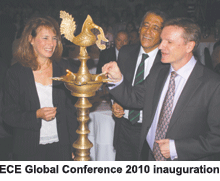 July 17. India’s first-ever Early Childhood Education (ECE) Global Conference 2010 was convened in Mumbai by EducationWorld to deliberate on the theme ‘ECE: Opportunities and Challenges’ and related issues. The ECE global confer-ence, which was attended by 247 fees-paying delegates comprising a mix of private pre-school promoters, educators, principals and teachers from across the country, attracted participation of a stellar cast of ECE experts and professionals from the US, Singapore and India. Among them: Dr. Elanna Yalow, US-based vice chair of the Knowledge Learning Corporation; Prof. Jeremy Williams, Singapore-based chief academic officer of Knowledge Universe; Kavita Sabharwal, founder-director of Neev pre-schools; Ashish Rajpal, managing director of iDiscoveri; Arun Khetan, CEO of iPlay iLearn; Jesus S.M. Lall, chairman of Universal Education Group; Lina Ashar of Kangaroo Kids and Dr. Vrinda Datta, professor at TISS, Mumbai. (Cover Story, EW August 2010)
July 17. India’s first-ever Early Childhood Education (ECE) Global Conference 2010 was convened in Mumbai by EducationWorld to deliberate on the theme ‘ECE: Opportunities and Challenges’ and related issues. The ECE global confer-ence, which was attended by 247 fees-paying delegates comprising a mix of private pre-school promoters, educators, principals and teachers from across the country, attracted participation of a stellar cast of ECE experts and professionals from the US, Singapore and India. Among them: Dr. Elanna Yalow, US-based vice chair of the Knowledge Learning Corporation; Prof. Jeremy Williams, Singapore-based chief academic officer of Knowledge Universe; Kavita Sabharwal, founder-director of Neev pre-schools; Ashish Rajpal, managing director of iDiscoveri; Arun Khetan, CEO of iPlay iLearn; Jesus S.M. Lall, chairman of Universal Education Group; Lina Ashar of Kangaroo Kids and Dr. Vrinda Datta, professor at TISS, Mumbai. (Cover Story, EW August 2010)
Court nixes tuition regulation directive
September 1. A two-judge bench of the Bombay high court struck down a government resolution (GR) dated July 15 appointing fees regulation committ-ees to determine the tuition fees of the 8,640 private unaided schools in Maharashtra. In Association of International Schools and Principals Foundation vs. State of Maharashtra (WP (L) No.1876 of 2010), the high court ruled that private independent schools have the right to determine their own tuition fees in keeping with Article 19(1) (g) of the Constitution which grants all citizens the right to practice any prof-ession, or to carry on any occupation, trade or business. (Education News, EW October 2010)
EW ranks India’s most respected schools
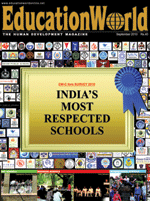 September 7. In the fourth annual EducationWorld survey of India’s most respected schools (2010), conducted by the Delhi-based market research and opinion polls agency C fore (Centre for forecasting and research), the Cathedral & John Connon School, Mumbai; Doon School, Dehradun and Rishi Valley, Chittoor (jointly); and Kodaikanal International School were rated India’s top day, boarding, and international schools respectively.
September 7. In the fourth annual EducationWorld survey of India’s most respected schools (2010), conducted by the Delhi-based market research and opinion polls agency C fore (Centre for forecasting and research), the Cathedral & John Connon School, Mumbai; Doon School, Dehradun and Rishi Valley, Chittoor (jointly); and Kodaikanal International School were rated India’s top day, boarding, and international schools respectively.
C-fore field personnel interviewed 2,062 parents, principals, teachers and knowledgeable educationists in 15 cities across India, to rate and rank India’s 250 most high profile schools on 12 performance parameters — academic reputation, co-curricular education, sports education, competence of faculty, individual attention to students, value for money, leadership/management quality, parental involvement, infras-tructure provision, quality of alumni, integrity/honesty. (Cover story EW September 2010)
Madras high court stays fees order
September 14. Delivering judgement on a batch of writ petitions filed by the managements of Tamil Nadu’s private unaided (independent) schools, challenging the imposition of a fee structure on them by a May 7 state government order, the Madras high court stayed the imposed fee structure for the current academic year. The Tamil Nadu Schools (Regulation of Collection of Fee) Act, 2009, had imposed a government-devised fee structure upon all 10,000 plus private unaided schools affiliated with the Tamil Nadu State Examinations Board. The common tuition fees structure was finalised by a state government-appointed Private School Fees Determination Committee which stipulated maximum tuition fees of Rs.11,000 per annum for all state board-affiliated private higher secondaries; Rs.9,000 for private high schools; Rs.8,000 for middle schools; Rs.5,000 for elementary schools and Rs.3,500 for private elementary schools in rural Tamil Nadu. (Education News, EW October 2010)
Booker-nominated novel dropped
September 15. University of Mumbai vice chancellor Dr. Rajan Welukar dropped Rohinton Mistry’s Booker-nominated novel Such a Long Journey (1991) from the second year BA English literature syllabus of its 670 affiliated colleges following a threat by the Bharatiya Vidyarthi Sena (BVS), the youth wing of Mumbai’s notorious right wing subnationalist political party, the Shiv Sena. BVS and particularly Aditya Thackeray (20) — grandson of Shiv Sena supremo Bal Thackeray — raised an objection to Such a Long Journey being included in the English syllabus on the ground that the novel contained derogatory references to the Shiv Sena, Mumbai’s dabbawalas, the Marathi manoos and Pandit Jawaharlal Nehru, utilising “extremely obscene and vulgar language in its text”. (Education News, EW November 2010)
Reprimand for Kapil Sibal
September 24. The parliamentary standing committee of the HRD ministry declined to pass the ministry’s Prohibition of Unfair Trade Practices Bill 2010 and the Medical Council of India Amendment Bill, 2010 on the ground that its recommendations on the Education Tribunals Bill, 2010 had not been complied with by the ministry. In a report to Parliament, the standing committee (every ministry is ‘attached’ to an all-party standing committee which scrutinises and tightens Bills drafted by the ministry for presentation and passage through both houses of Parliament) recommended “a wider consultation process involving all the state and Union territory governments”.
This decision has been interpreted as an implicit reprimand to HRD minister Kapil Sibal who has been grabbing headlines with his flurry of proposals and Bills to reform Indian education. (Education News, EW October 2010)
Unified admissions for Central universities
September 30. At a conference of vice chancellors of Central universities held in New Delhi, participants agreed in principle to a proposal to introduce a unified admission process for admitting students into undergrad and postgrad programmes of 39 Central government universities countrywide. The unified admission process prescribes a common national aptitude test with some weightage given to marks obtained in the class XII school-leaving examination.
This proposal of the Union HRD ministry, which directly administers the 39 Central universities, has raised questions relating to the autonomy of universities with some vice chancellors resenting centralisation of admissions which will eliminate their discretionary powers. The unified admission process is proposed to be introduced in the academic year 2011-12. (Education News, EW November 2010)
DUTA withdraws strike
October 29. The Delhi University Teachers Association (DUTA) informed the Delhi high court that it will withdraw its five-day strike against implement-ation of the semester system in Delhi University. DUTA counsel assured the court that the strike will be withdrawn and teachers will resume classes but will follow the annual teaching system. Teachers have been protesting against implementation of the semester system by the university at the undergraduate level in science study programmes from the academic year 2009-10.
FTII students protest Hewitt Report
November 12. Students of Pune’s famous Film & Television Institute of India (FTII, estb. 1960) protested a draft report prepared by the Gurgaon-based Hewitt Association on ‘upgradation of FTII to international standards’. The Hewitt report states that FTII should be re-modelled along the lines of public-private-partnership with introduction of highly priced short-term courses to transform it into a profit-generating institute.
According to the students association, FTII’s syllabus for the 14 programmes it currently offers needs to be urgently upgraded and a new batch of students must not be admitted until the curriculum revision process is completed. Improvement of existing infrastructure including hostel facilities and technical equipment to accomm-odate an increasing number of students, a freeze on tuition fees, and filling up of vacant faculty positions are the other demands made by the FTII Students Association.
Against the background of rising student protests, the FTII management has appointed a P.K. Nair Committee (favoured by students) to study the course structure and recommend proposals to upgrade the syllabus and infrastructure. (Education News, EW December)
Nursery admissions guidelines released
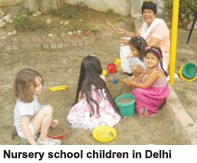 December 21. The Delhi state government announced a schedule and guidelines for admissions into nursery classes for all schools including private unaided, in the national capital region for the academic session 2011-12. Delhi education minister Arvinder Singh Lovely warned of action against private schools which failed to follow the common admission sched-ule and guidelines.
December 21. The Delhi state government announced a schedule and guidelines for admissions into nursery classes for all schools including private unaided, in the national capital region for the academic session 2011-12. Delhi education minister Arvinder Singh Lovely warned of action against private schools which failed to follow the common admission sched-ule and guidelines.
However schools have been given the flexibility to decide their admission criteria based on the nature and number of applications received and objectives of the school. Profiling of children based on the academic qualifications and income of parents is prohibited under the new admissions regulations. All schools have to publicise their admission policy and have been advised to use both the points as well as the lottery system to select children.
Delhi records 10,000 RTE violations
December 21. The Delhi Commission for Protection of Child Rights (DCPCR), which monitors implementation of the Right to Free and Compulsory Education Act, 2009 in the national capital region, revealed that it has received over 10,000 complaints against schools alleging violations of provisions of the Act, which became law on April 1. According to DCPCR chief Amod Kanth, over 10,600 children were subject to discrimination in the past nine months.
In most cases, the violations ranged from denial of admission to children from economically weaker sections, schools charging high fees and conduc-ting admission screening tests. S. 12 (c) of RTE Act, 2009 mandates private unaided schools to reserve 25 percent of capacity in pre-school/class I for poor neighbourhood children while s.13 prohibits admission/entrance tests.